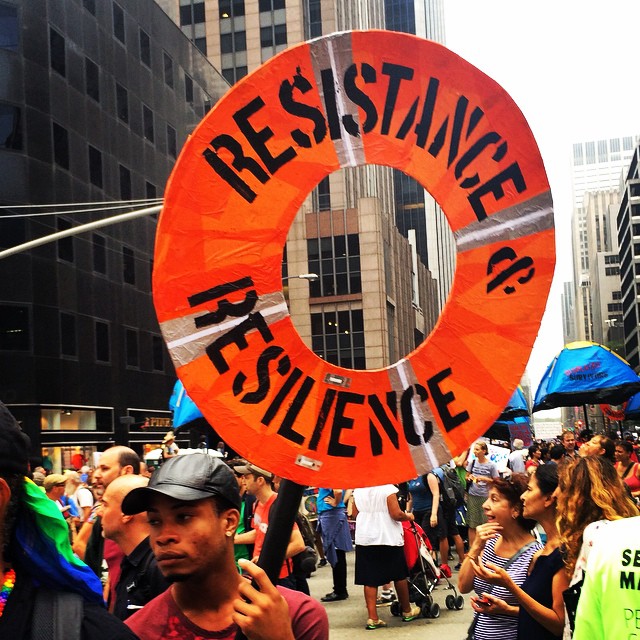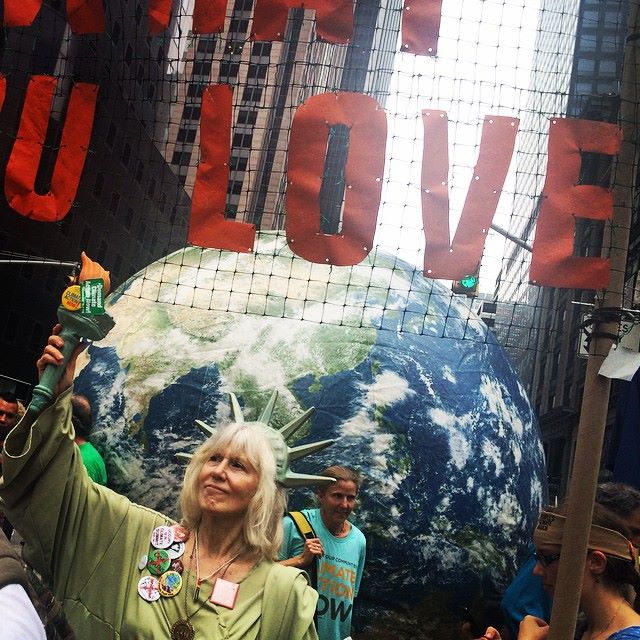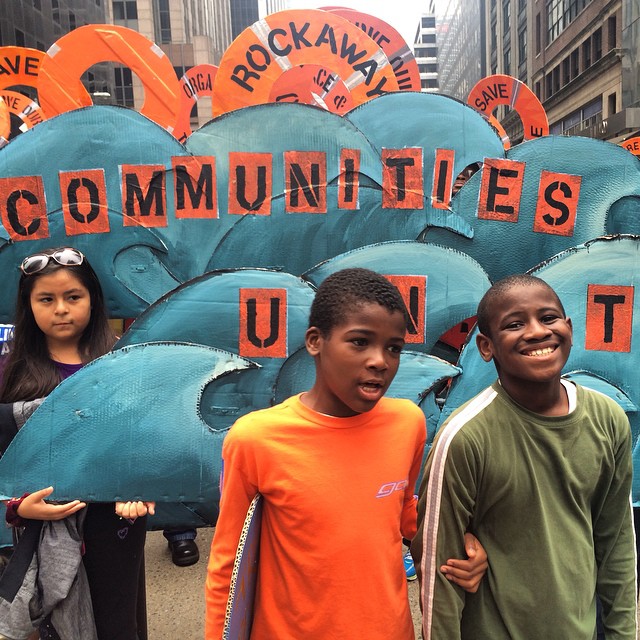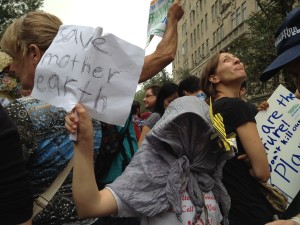FIELD NOTES :: CLARINDA MAC LOW :: MARCHING AS METAPHOR
[box] For this special edition of our long-running FIELD NOTES series, Clarinda Mac Low (performance and installation artist, journalist, Culture Push director, and all-around making-happen-er of things) adds her voice to the chorus of questions seemingly never far from the mind these days: what, exactly, is happening to this place in which we live? And what, if anything, can I do about it? While we can’t hope to have the answer, this piece continues our mission of dedication to open dialogue around the artist-activist cause (check out interviews with global organizers for the 100,000 Poets for Change series, this piece on Musicians for Sandy, and “We are the Hundred Percent,” an interview with Velcrow Ripper, Filmmaker/Creative force behind Occupy Love, for a start). Gratitude to contributor Chloe Bass for making the connection and to Ripper, who provided the striking photos of the march you see here. – Lynne DeSilva-Johnson, ed. [/box]
The People’s Climate March, which took place in New York City on Sunday, Sept. 21, 2014, was the perfect embodiment of tackling climate change.
Over the course of the day, at least 400,000 people flooded Central Park West and (eventually) walked through the pre-determined route down to 34th St. and 11th Ave. I attended the march with my family, spouse, and friends, arriving at 82nd St. and Central Park West a little before 11 AM after packing sardine-style into a joyful subway car.
“Climate change” is the phrase currently used to invoke the tremendous anthropogenic changes taking place on our planet. It is a mild, sober phrase, two little words that contain a snake’s nest of disasters and transformations that will drastically alter life on Earth over the next century. This cluster of phenomena was formerly known as “global warming,” until it became clear that the effects of human consumption will be far more complex than a mere warming trend.
[superquote]Waiting or marching, it was the same—the point was to gather.[/superquote]
My group and I, an unaffiliated scattering of artists, scientists, artist-scientists, journalists, and children, somehow ended up in the midst of the bee-keepers. This was a lucky break, because for some reason the bee-keepers (whom I think were more bee allies than actual bee-keepers) had fabulous costumes and included a highly engaged group of dancers and singers under the auspices of the Reverend Billy. We were abutted by a melting iceberg and a group of scientists in lab coats with a rolling blackboard, and briefly joined by a group of shirtless young men with slogans painted on their chests and college fraternity symbols on their hats.
Addressing climate change requires addressing every part of our lives. It requires looking at the things that we don’t want to look at, and doing the things we don’t want to do. It requires wresting power from the most powerful and greedy people in the world. It feels impossible. It’s a heavy weight that requires strength of character and strange alliances. As the organizers of the Climate March put it, “To change everything, we need everyone.”
On 82nd St., we waited. And we waited. And we waited. And waited. We had a moment of silence, followed by tremendous, awe-inspiring wave of sound sweeping down through hundreds of thousands of throats as we announced our presence. Then we waited some more. At around 12:30 PM we heard a rumor of movement down on 61st St. We calculated that it would be about an hour before we started moving. So we waited. I didn’t mind. Waiting or marching, it was the same—the point was to gather. Movement forward would be good, but first, we had to bring everybody in who wanted in.
For over 20 years climate change has been an issue. In the past five years or so (an off-hand conjecture) it has been at the forefront of political debate. And yet, almost nothing has happened to alleviate the accelerating change. Hundreds of thousands, even millions, of people have been beating on the doors of government and industry, pleading for drastic action. Scientists have been driven to hair-tearing distraction by climate-change deniers, corporate stalling, and indifference. Nothing moves. There are rumors of possible legislation, shifting energy industries, angry speeches by the leaders of island nations, but nothing pans out, or what pans out is so weak as to be the equivalent of nothing.
[superquote]Addressing climate change requires addressing every part of our lives. It requires looking at the things that we don’t want to look at, and doing the things we don’t want to do. It requires wresting power from the most powerful and greedy people in the world. It feels impossible. It’s a heavy weight that requires strength of character and strange alliances. As the organizers of the Climate March put it, “To change everything, we need everyone.”[/superquote]
At 1:45 PM some kind of movement seemed to be happening. It was hard to tell. People were trickling past us, our area was thinning out. At around 2:15 PM we moved! One block. At 2:20 PM we got impatient, and decided to start following the trickling people. My 11-year-old niece led us rapidly through the crowd, until we found a spot that was moving. Then it stopped. We waited.
Something is happening. There are people who acted early and kept shouting, there are people who were impatient and figured out ways around the typical channels. They were the vanguard, and they were often young, smart, and energetic. But even with their leadership very little was shifted.
Finally, we started moving more, stopping and starting, but moving steadily, until, by the time we got to 72nd St. (at about 3 PM) we were walking at a good clip. By this time we had joined the anti-fracking contingent, which included a complex puppet performance, by a group performance opposing the mining of the Canadian tar sands with reindeer, butterflies, and an enormous black skull spewing plastic oil.
[Ed: This is none other than Vermont based, classic performance-activist-puppeteers Bread and Puppet Theater’s contribution to the festival, a 3 and a half minute play repeated for the duration of the march. See below.]
Something is happening. There is movement. There is a broad-based coalition. There is an understanding of the complexity of the issue (not just pipelines, but also income inequality; not just fossil fuel use, but also racism and ethnic oppression; not just habitat destruction, but also untenable structures of capital). There is a tremendous amount of creativity, joy, determination, and, at the bottom, desperation. It feels like there MUST be hope, with all this in hand.
[superquote]There is a tremendous amount of creativity, joy, determination, and, at the bottom, desperation. It feels like there MUST be hope, with all this in hand.[/superquote]
I didn’t make it to the end of the march. I admit that my strength failed—I was exhausted and hungry, not prepared for more than five hours of standing and walking. At 59th St. my spouse and I exited the march and climbed onto a (mercifully uncrowded) subway car. Hundreds of thousands of others stayed with it, and swept onto Jacob Javitz Plaza, where they were met by unfriendly security guards and lots of friends.
This multi-tentacled problem may be intractable. Staying the course requires tremendous strength and dedication. Dealing with the problem is a painful process that will require sacrifices that most people are not prepared to make. And, no matter what we do, the process of change is already irreversible. Our greatest efforts will only slow it, not reverse it. We are already living in the new world.
And yet, and still. As the organizers of the march trumpeted, “100+ world leaders gathered in NYC. 2808 solidarity events in 166 countries. The largest climate march in history.” Something is happening; a wide-spread understanding of the seriousness of the issue. It may be too little too late, but if we go down, we will go down attempting to enact a beautiful new mode of organizing our society. As we slip into disaster we are also slipping into a new phase of history. We are living, as the curse says, in interesting times.
[line]
CLARINDA MAC LOW started out working in dance and molecular biology in the late 1980s and now works in performance and installation and creates participatory events of all types while simultaneously keeping up a practice of medical journalism, specializing in HIV/AIDS. Her solo and collaborative works have appeared at Projekt 722, P.S. 122, the Kitchen, X-Initiative, and many other places and spaces around New York City and elsewhere in the world, including a park in Siberia and the Manifesta Biennial in Spain. Recent work includes “Free the Orphans,” a project based around creative work with unknown copyright holders; “The Year of Dance”, an anthropology of the NYC dance world, TRYST, performance interventions into everyday life; and “Cyborg Nation,” public conversation on the technological body and the nature of intimacy. She has participated in many different residencies, including as a MacDowell Fellow (2000), a DTW ARM Fellow (2004-2005), through the Society for Cultural Exchange in Pittsburgh and as a guest at Yaddo and Mount Tremper Arts (2012). She received a BAX Award in 2004, a Foundation for Contemporary Arts grant, 2007 and a 2010 Franklin Furnace Fund for Performance Art grant. Mac Low is Executive Director of Culture Push, a cross-disciplinary organization encouraging hands-on participation and strong hybrid ideas. She holds a BA in Dance and Molecular Biology from Wesleyan University and an MFA in Digital and Interdisciplinary Arts Practice from the City College of New York-CUNY.
[line]
[recent_post_thumbs border=”yes”]






